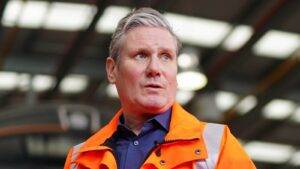<?xml encoding=”utf-8″ ?????????>
Labour leader Sir Keir Starmer has unveiled plans for what he terms a “patriotic economy,” with a primary focus on bolstering home ownership and revitalising communities through the creation of new towns.
The announcement, made during a visit to a housing development in the West Midlands, signals Labour’s commitment to reshaping economic priorities if elected.
Sir Keir emphasized the need for a future “built in Britain, by Britain, for Britain,” underscoring concerns over declining living standards and accessibility to homeownership opportunities. He criticized the Conservative Party’s economic policies, accusing them of failing British workers and interests, and asserted that the traditional belief in the rewards of hard work has eroded under their governance.
Key components of Labour’s housing agenda include a pledge to reform planning laws to facilitate the construction of 1.5 million new homes and the establishment of a “next generation” of towns. Funding for these initiatives would be sourced through increased taxes on foreign owners of UK property, aligning with Labour’s broader strategy to promote domestic investment and address housing affordability challenges.
In addition to the ambitious housing targets, Labour aims to deliver a substantial boost to affordable, social, and council housing, with stricter regulations to prevent developers from evading their planning obligations.
However, the Conservative response has been critical, with Housing Minister Lee Rowley dismissing Labour’s proposals as “empty” and asserting that the party lacks a coherent plan. Rowley highlighted previous instances where Labour purportedly hindered housing development and criticized Deputy Leader Angela Rayner over allegations related to social housing.
The timing of Labour’s housing announcement coincides with recent revisions to the party’s environmental agenda, notably the decision to scale back on green investments from the initially proposed £28 billion per year to £23.7 billion over the course of their first term. This adjustment has drawn condemnation from environmental campaigners and provided ammunition for Conservative critiques, with Chancellor Rishi Sunak accusing Sir Keir of lacking a viable plan for Britain’s economic future.
Labour’s departure from its earlier environmental pledge has been portrayed by Conservatives as indicative of inconsistency and indecision within the party’s policy framework, a narrative they aim to exploit in future electoral contests.
As the political landscape continues to evolve, the debate over economic priorities and policy direction is set to remain a focal point, with both major parties seeking to position themselves as champions of prosperity and progress for the nation.
